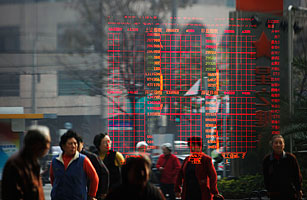
Women exercising are reflected in a window at a securities exchange firm in Shanghai, China, on Nov. 25, 2010
(2 of 3)
Second, the adage "It's the economy, stupid", so notably used by Bill Clinton during his 1992 presidential campaign which has pretty much held up in the West, does not hold true for Asia. Asia has achieved rapid economic growth but not domestic political stability. From developed countries like Japan to developing countries like Thailand, from democracies like the Philippines to authoritarian regimes like China, most Asian countries continue to be plagued by volatile domestic politics despite economic growth. Such instability can be partially attributed to the fact that Asia leans heavily toward elite governance, which is deeply embedded in Asian culture. It is virtually impossible for unknowns to make the mark. Political leaders are usually descendents of political pedigree or foreign-educated elites. The current political turmoil in Thailand is fundamentally a struggle between the rural class and the ruling elites, and Japan which has appointed five Prime Ministers in four years, has only one Prime Minister, Junichiro Koizumi (notably a "non-blue blood") who has completed the full five-year term of office since 1972. This is a critical problem because if Asia does not achieve domestic stability, continued upheavals would certainly hamper economic growth.
Third, there is marked wealth disparity in Asian countries, without in-built mechanisms to handle the social ramifications or to redistribute wealth. According to an Asian Development Bank report in 2007, income inequality is on the rise in Asia and out of the 22 countries examined, 15 showed a rise in the difference in incomes of the rich and poor. (1) Asian countries have increasingly restive domestic populations as they make the transition from elation as a result of economic growth to disillusionment realizing that they are not going to benefit directly from the growth. And yet the Western solution of social safety nets and welfare systems might not work for Asia. Currently, only urban dwellers in China are covered under a very basic pension scheme and yet, the pension system is already the single largest expenditure of the Chinese government. To include coverage of the remaining 900 million rural population (currently a trial scheme) would be a formidable task. Corruption and nepotism are also deeply embedded in many Asian societies.
Fourth, as many Asian countries have only recently (re)acquired their sovereignty, they guard it warily, and are apprehensive about any membership in organizations that requires them to cede sovereignty in name or in form. As a result, Asia is more inclined toward consensus-building, rather than applying pressure to influence behavior of other countries. Asia also prefers less committal and non-interventionist modes of conflict resolution.
These characteristics of Asia necessitate a different paradigm in dealing with Asia's problems and charting its future development. In addition, Asia's newfound wealth affords it the resources and confidence to explore new modes of development and problem-solving. Decoupling is necessary for Asia to actualize its potential, and contribute proactively and constructively to the world. Decoupling would also allow Asian countries to have a more equal and productive relationship with their Western counterparts. However, the process of decoupling is fraught with several barriers.
A Delicate Balance
Decoupling is generally perceived negatively and it is indeed a delicate balance. The key is not to disengage, but to reduce reliance, diversify and find Asia's niche and optimality. It is important not to alienate the West in the process. The rapid growth in intra-regional trade (which now accounts for more than fifty percent of trade in Asia according to the IMF), formation of regional organizations like ASEAN and its affiliated organizations, calls for the formation of an East Asian community and the reduced reliance on foreign capital have triggered fears of the formation of an Asian bloc, designed to keep out the West. (2) This should not be the intent of Asia, and to fuel such a perception would be counter-productive — Asia needs the West and vice versa.